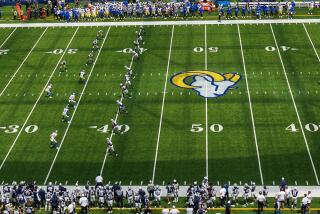NFL team owners could help resolve officiating dispute
NFL replacement officials are making a lot of mistakes in games, have you heard?
Of course you have. Because the NFL blew the handling of this labor fight, and suddenly the officiating of games — which should be an afterthought — has been shoved to center stage.
Sometimes, the games go smoothly, as Giants-Panthers did Thursday night. But other times, they’re a fiasco, lurching along with stoppages and zebra huddles every few plays. The first quarter of Monday night’s Broncos-Falcons game lasted almost one hour, and felt like two.
There have been awkward truths too, like finding out the line judge assigned to the Saints-Panthers game was actually a Saints fan, and had the Facebook pictures to prove it (he was relieved of his duties before the game). Or the official who had been paid by the Seattle Seahawks to work their practices. Or the replacement who during a game told Philadelphia’s LeSean McCoy, “I need you for my fantasy team.” Or the first female official, who was once a World Series of Poker competitor, a no-no in a league so careful about keeping its distance from Las Vegas.
Regardless, the league is not budging, and it warned players and coaches to keep their opinions to themselves, rather than publicly venting about the stand-ins. As inconsistent as the officiating has been, every indication is the NFL is in this for the duration.
Unless …
This is what could thaw the ice: If enough team owners complain — or the most powerful ones — the league will do what’s necessary to bring back the regular officials.
It’s not going to be grousing by the fans, or the media, or the players, or the locked-out officials. This boulder won’t be rolled away until the 32 bosses of Commissioner Roger Goodell insist it must be.
The situation from last week that jumps out is the accusations by Washington rookie quarterback Robert Griffin III that St. Louis defenders were “dirty” and “cheap” in the way they hit him.
Redskins Coach Mike Shanahan backed him up on that and shifted the responsibility to the officials, saying, “You have to have people take control. And there wasn’t any control in that game. Hopefully, officials next week will take control. That’s what you have to do as an official.”
So now we have one of football’s most respected coaches — who works for one of the league’s most powerful owners — echoing the party line of the locked-out officials, that the game is not as safe with the replacements on the field. If Dan Snyder is similarly swayed, that turns up the pressure on the league office.
If a game is decided by a bad call, or a pivotal player is injured because replacements lost control of what’s happening on the field, that could force a quick resolution. As for the complaining, grousing, and uncomfortable discoveries, the NFL has already shown it’s prepared to live with that.
Pouting Panther
It’s good that Cam Newton cares. It’s refreshing that he was embarrassed by the way the Panthers played in their 36-7 home loss to the Giants. But the Carolina quarterback has to pull it together at the podium better than he did after the game, when he repeatedly tilted his head back, shut his eyes and sighed at questions, then gave the Giants no credit for what they did, only insisting Carolina lost because of its mistakes.
There’s no denying Newton is a great player, but he’s showing his immaturity. Receiver Steve Smith told reporters he had some “unchoice words” for Newton about sulking on the sideline.
Newton isn’t the only quarterback who does that. Jay Cutler is famous for that in Chicago, and Eli Manning took a lot of heat for his sleepy stare and flat-liner body language on the field.
Then again, Manning doesn’t hear that stuff anymore. Two Super Bowl rings took care of that.
Panic button
Had a conversation with Al Michaels this week, and the NBC announcer had an interesting observation about the New England-Baltimore game: The fans of whichever team loses that game are in for a long week. Their Super Bowl contender, either the Patriots or Ravens, will be 1-2 and the ensuing panic is inevitable.
Detroit Coach Jim Schwartz calls it “Overreaction Monday,” and it’s coming.
A 60-minute game
Having your defensive line aggressively fire off the ball when the other team is just trying to take a knee to end the game is despicable, unforgivable, the lowest of the low.
Except if it works.
twitter.com/LATimesfarmer
More to Read
Go beyond the scoreboard
Get the latest on L.A.'s teams in the daily Sports Report newsletter.
You may occasionally receive promotional content from the Los Angeles Times.











